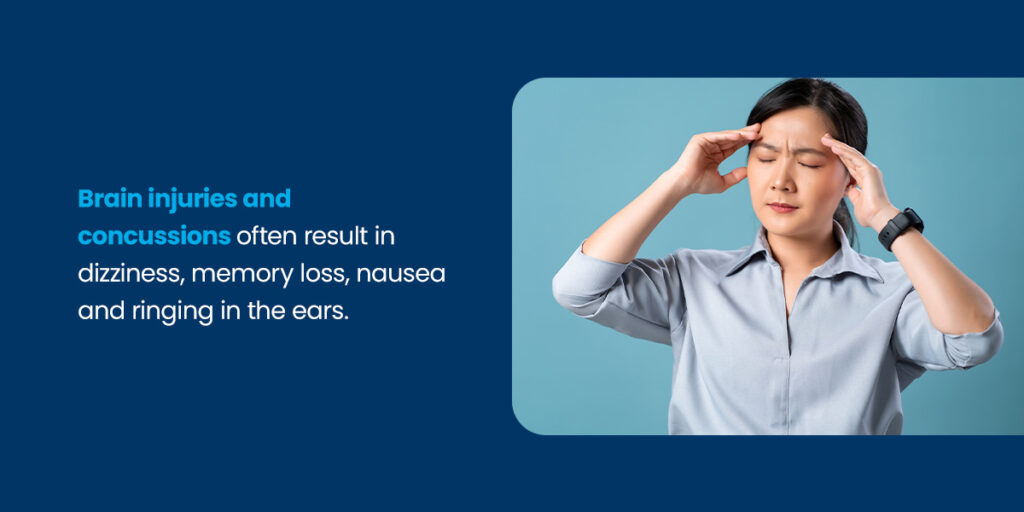The National Safety Council’s (NSC) latest report indicates that car accidents in America caused 5.2 million injuries in 2022. Many people receive treatment soon after an accident and can begin their journey to recovery — yet some injuries cause long-term damage.
One example is tinnitus or ear ringing after a car accident. If you are involved in a car accident and experience tinnitus symptoms, you may be unsure about the steps to resolve this issue. Our guide will answer this question and more.
Tinnitus is an auditory condition characterized by clicking, buzzing or ringing in the ears. These sounds generally occur in both ears, yet some people experience it in just one ear or alternative ears.
Tinnitus affects over 50 million American adults and occurs for many reasons, from ear infections and high blood pressure to old age. However, tinnitus is also a frequent consequence of car accidents. The loud noises and extreme physical impact associated with car accidents can trigger a ringing sound in the ears. If you or a loved one does not receive appropriate treatment for tinnitus, it can cause feelings of frustration or lead to other health concerns.
If you’ve been in a car accident, you may experience signs of tinnitus. Common symptoms include:
These symptoms may initially conceal tinnitus. Booking an appointment with a medical professional once you first notice these signs can help limit the chances of developing the condition.
If you have tinnitus for more than six months, medical professionals often classify your condition as chronic. At this point, you should explore additional treatment options.
As tinnitus sounds are primarily subjective — meaning the patient is the only one who experiences the symptoms — it can be challenging to describe your condition. It’s worthwhile to seek out professionals who specialize in tinnitus after auto accidents to get an accurate diagnosis and a streamlined treatment plan.
Several things can trigger tinnitus after a car accident. Here are some of the most common reasons:
When a vehicle collides with another object, the impact often causes the passenger’s head and neck to jerk back and forth at speed. The condition that follows is called whiplash.
People experience different whiplash symptoms, such as mild neck tenderness to fractured vertebrae in extreme cases. However, one of the more common outcomes is tinnitus. The collision causes the brain to knock against the skull, causing ear pain, which can develop into tinnitus.

Brain injuries or concussions are one of the more severe outcomes of car accidents. These are likely to occur when the passenger’s head contacts another object. Even when a car travels at a moderate speed, the person’s head will connect with an object at a higher velocity.
Brain injuries and concussions often result in dizziness, memory loss, nausea and ringing in the ears. The passenger must receive medical attention after a suspected brain injury or concussion to prevent long-term damage. It is also crucial that they remain awake until a medical professional gives them the all-clear.
While chronic neck pain is a rare reason behind tinnitus after a car accident, it is certainly a relevant concern. Signs that could indicate that neck pain is behind the ringing in your ears include:
Your ear has three main parts — the outer ear — including the eardrum — the middle ear and the inner ear. When a collision occurs, loud noises impact the outer and middle ear. The person’s proximity to the sound and the decibel rating can influence the extent of damage to the thin membrane in the eardrum or middle ear.
If this occurs, fluid can build up in your ear, causing headaches, dizziness, vomiting and constant ringing in the affected ear.
Airbags effectively prevent passengers from moving toward the windshield on impact. As these lifesaving devices deploy, they make a loud noise. Since the person is so close to the noise, their eardrums may rupture, causing extreme discomfort. In some cases, a ruptured eardrum also leads to tinnitus.
While eardrums will likely heal independently over a few weeks, the ringing in your ears can remain longer. A medical professional can diagnose ringing in ears after airbag deployment and recommend treatment.
Tinnitus is generally a temporary condition, yet it can become permanent. How long you experience ringing in your ears often depends on the cause. For example, it’s common to experience ringing briefly after a loud bang or a strong impact. However, if the ringing continues for months, it may be more permanent.
Medical professionals will explore various treatments before determining if your tinnitus is permanent.
There is no one-size-fits-all solution for tinnitus. Medical professionals often run a series of tests before prescribing a treatment plan, including:
Once medical professionals uncover the cause of your tinnitus, they will devise a strategy to treat it accordingly. Treatment programs often involve sound therapies, medication or even stress-reducing exercises.
Tinnitus can be an inhibiting condition. If you experience ringing in your ears after a car accident, you may need medical assistance. Seeking treatment at the onset of your symptoms will give you the best chance at recovery!
Complete Care is passionate about helping people get the treatment they need for tinnitus or other injuries related to auto accidents. Our multiple care centers around Florida and extended treatment hours make booking an appointment at a convenient time and location easy. Schedule an appointment with our professional team or call us today at (844) 699-2273 to take the first step on your healing journey!

The information provided on this website does not, and is not intended to, constitute legal advice; instead, all information, content, and materials available on this site are for general informational purposes only. Information on this website may not constitute the most up-to-date legal or other information. This website contains links to other third-party websites. Such links are only for the convenience of the reader, user or browser.